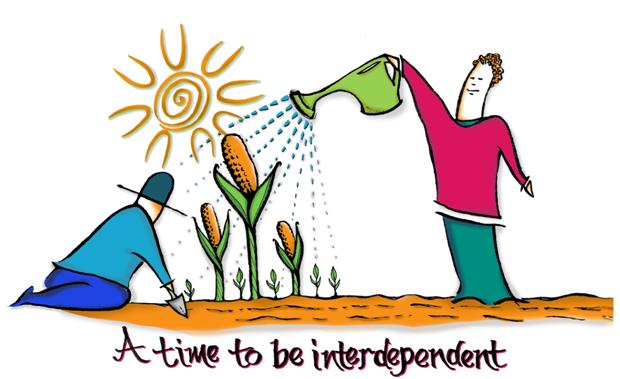A sense of fulfilling one’s nature or purpose in response to the challenges of a particular historical and societal context.
Our understanding of the world is not a spectator sport, but more like an active ingredient in societal renewal.
Bildung is about our responsibility for and participation in an evolving process of social maturation that reimagines culture, technology, institutions and policies for the greater good.
Bildung entails a dynamic world view that values independence of mind and spirit grounded in ecological and social interdependence.
These qualities of heart and mind are not optional extras for the transition to a better world:
- how well we learn to perceive and feel and know differently,
- our capacity to question our assumptions,
- our inclination to empathise with strangers,
- to relate wisely to what is old and new,
- to perceive the relationship between parts and wholes
Our task is not so much to “be the change we want to see in the world”, it rather is to become the change we want to see in the world.
Jon Amos Comenius is considered by many to be the father of the idea of universal or democratic education. A Czech philosopher and theologian who lived from 1592 to 1670, he declined the offer to be President of Harvard University. His genius lay in grasping that since learning is as natural as breathing or eating or sleeping, education should be seen as an aspect of nature’s formative process; and since nature is often experienced as sacred, and we are part of nature, an organism’s lifelong disposition to learn is the wellspring of meaning and purpose in life.
The authors of The Nordic Secret, Lene Rachel Andersen and Tomas Bjorkman argue that Bildung lies at the heart of their story of how the Nordic countries developed from poor agrarian and mostly authoritarian societies, to affluent, stable and relatively happy social democracies. They encapsulate the idea as follows:
“Bildung is the way that the individual matures and takes upon him or herself ever bigger personal responsibility towards family, friends, fellow citizens, society, humanity, our globe, and the global heritage of our species, while enjoying ever bigger personal, moral and existential freedoms. It is the enculturation and life-long learning that forces us to grow and change, it is existential and emotional depth, it is life-long interaction and struggles with new knowledge, culture, art, science, new perspectives, new people, and new truths, and it is being an active citizen in adulthood. Bildung is a constant process that never ends.”
The notion that we become ‘more’ human through various forms of maturation or development lies at the heart of Bildung, and sets it apart from other forms of education. This notion has many intellectual forebears and Hegel is certainly one of them. In The Phenomenology of Mind he writes:
“The spirit is never at rest but always engaged in ever progressive motion, in giving itself new form.”
Returning to Bildung as praxis, the profound interplay of biological, psychological, social and spiritual features of life is reflected in a line from the classic 1943 text, Education through Art, by Herbert Read:
“The aim of imaginative education…is to give the individual a concrete sensuous awareness of the harmony and rhythm which enters into the constitution of all living bodies and plants, which is the formal basis of all works of art, to the end that the child, in its life and activities, shall partake of the same organic grace and beauty. By means of such education we instil into the child that ‘instinct of relationship’ which, even before the advent of reason, enable it to distinguish the beautiful from the ugly, the good from the evil, the right pattern of behaviour from the wrong pattern, the noble person from the ignoble.”
Source: Why sustainable prosperity depends upon reimagining education | Essay by Jonathan Rowson · CUSP
- Download full paper (pdf, 1.2MB)
- The essay forms part of a series within the work programme of CUSP, investigating the philosophical understandings of sustainable prosperity.
A healthy society that is attuned to nature and other sources of intrinsic value depends upon making this educative process the axis upon which society turns.
Piaget, J. (1993) John Amos Comenius Prospects (UNESCO, International Bureau of Education), vol. XXIII, no. 1/2, p. 173-96. Available Online
